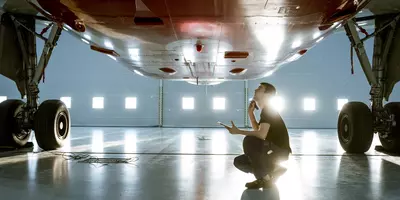
31 Mar 2025 ● Careers in Aerospace
How to write a good CV
What is a CV?
A CV, which stands for curriculum vitae, is a document used when applying for jobs. A CV allows you to summarise your education, skills & experience enabling you to successfully sell your abilities to potential employers. In North America, CVs are known as résumés. Resumes tend to be more concise (typically 1 page long).
How long should a CV be?
A standard CV in the UK should be no longer than two sides of A4. To save space only include the main points of your education and experience. Stick to relevant information and don’t repeat what you’ve said in your cover letter. As your career progresses, your CV may extend over three pages.
What should I include in my CV?
- Contact details – Include your full name, mobile number and email address. Don’t include personal information such as your date of birth, home address or a photograph.
- Profile/Summary – Usually placed at the beginning of the CV, the summary section picks out a few relevant achievements and skills, while expressing your career aims. The profile summary has to be job-specific and should also be kept short and snappy.
- Education – List and date all previous education, including professional qualifications. Place the most recent first.
Work experience with a focus on your achievements and NOT your responsibilities –
List your work experience in reverse date order, but make sure that anything you mention is relevant to the job you’re applying for. Don’t worry if you have limited experience in aerospace and aviation, all experience counts, particularly dealing with customers. problem solving and teamwork. Retail, hospitality and voluntary work can all develop crucial transferable skills for our industry.
- Skills – Foreign languages and IT packages you can competently use should come under this section. The key skills that you list should be relevant to the job.
- Hobbies and interest – Role relevant interests can provide a more complete picture of who you are, as well as giving you something to talk about at interview. Do you write your own blog, do you have podcast? If it is relevant, mention it.
- References – Don’t say ‘references available upon request’. Most employers would assume this to be the case.
How should I format the CV?
- Avoid fancy fonts. Choose something professional, clear and easy to read such Arial. Use a font size between 10 and 12 to make sure that potential employers can read your CV.
- List everything in reverse chronological order so the recruiter or hiring manager sees your work history and most recent achievements first.
- Keep your CV concise by using clear spacing and bullet points. A well-crafted CV should allow potential employers to skim your CV and quickly pick out important information first.
Top CV tips to really stand out
- Use active verbs when possible. For example, include words like ‘created’, ‘analysed’ and ‘managed’ to present yourself as a person who shows initiative.
- Pay attention to spelling and grammar. Use a spell checker and enlist a second pair of eyes to check over the document.
- Avoid generic, over-used phrases such as ‘team player’, ‘hardworking’ and ‘multitasker’. Instead, provide real-life examples that demonstrate all of these skills.
- Tailor your CV for the role you are applying for. Look at your target company’s website and social media accounts. Have they been mentioned the press? Do your homework.
- Make sure your email address sounds professional. First impressions count.
- Don’t lie or exaggerate on your CV or job application. Not only will you demonstrate your dishonesty to a potential employer, but there can be serious consequences too.
Next steps
Ensure you have your CV checked by a careers advisor, friend or colleague. Whether you are a student, recent graduate or apprentice, service leaver or experienced professional, you can use the RAeS Careers Centre’s 1-2-1 appointment service to have your CV checked. The service is free of charge and available in person or by phone, by appointment only.
Alternatively if you are a current student you could organise a FREE RAeS Careers and CV Workshop at your university or college if you can get together a group of 10 people or more. Contact the RAeS Careers team for more information.
Finally, don't forget to visit the Career Resources section of the Careers in Aerospace website. there you'll find advice and additional resources to help you in your job search and during the application process to help you secure your dream job in aerospace or aviation.
Useful links
- CIAAL website: Careers in Aerospace
- Career Flightpath: Career Flightpath Platform
- RAeS Aeroversity: RAeS | Dashboard


